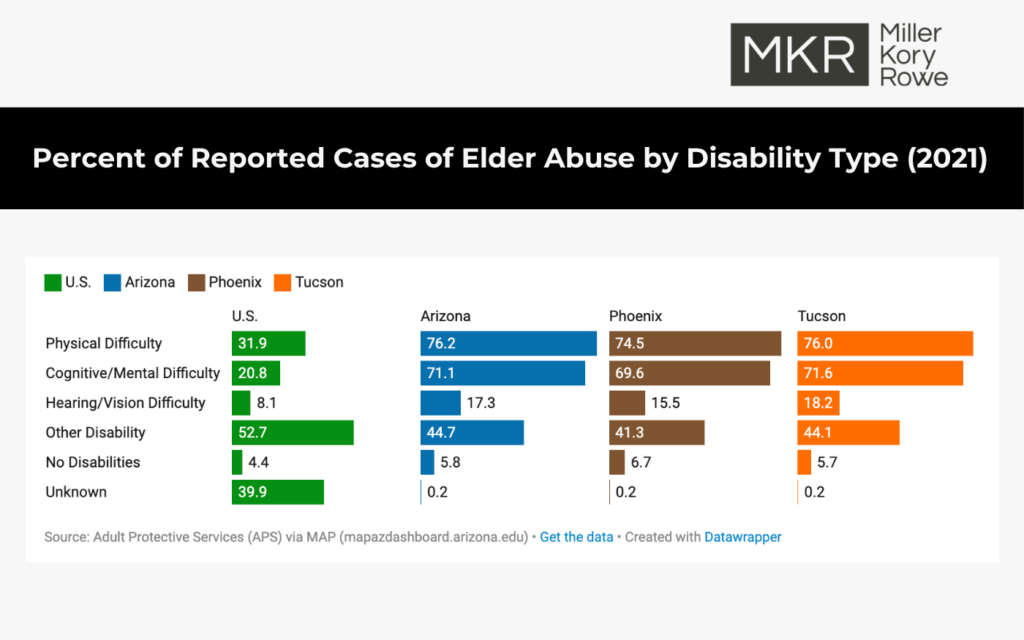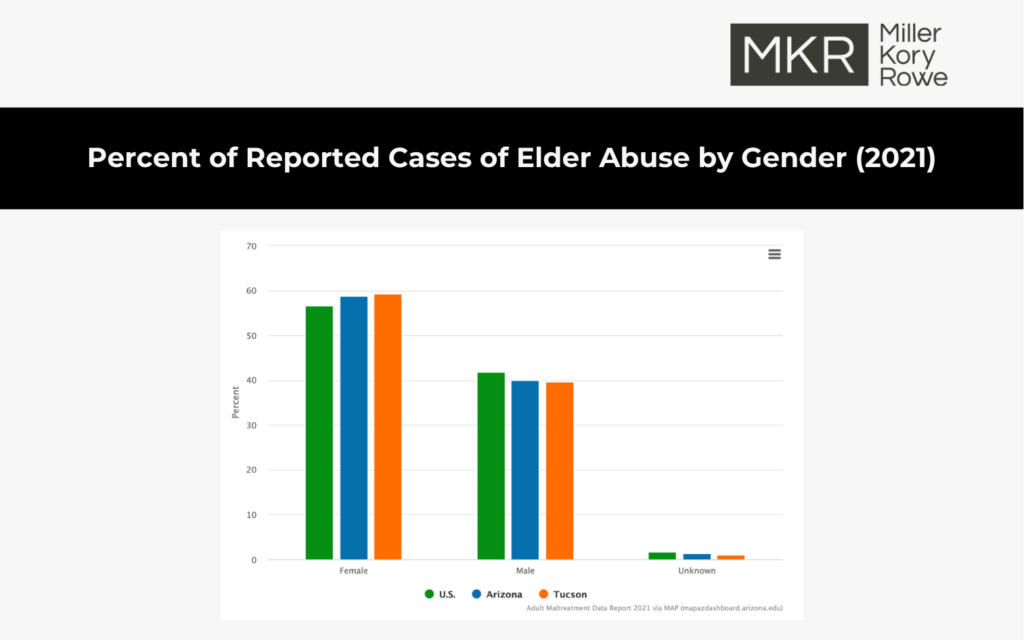Arizona’s older adult population (65 and older) has grown steadily, rising from about 1.22 million in 2018 to approximately 1.38 million by 2022 (U.S. Census Bureau).
By 2023, nearly one in five Arizonans were seniors, emphasizing the increasing importance of elder care services and oversight in the state.
The same year, Arizona received over 30,000 reports of elder abuse, an alarming increase with no signs of slowing. A significant number of these cases involved nursing homes and long-term care facilities, where issues like neglect, physical harm, emotional abuse, and financial exploitation are disturbingly common.
This article outlines the types of nursing home abuse common in Arizona, warning signs to watch for, what the law says, and what to do if you suspect your loved one is at risk.
Understanding the Scope of the Problem in Arizona
Nationwide, nearly 1 in 10 adults over 60 has experienced some form of elder abuse, according to the National Council on Aging. Arizona reflects, and in some areas exceeds, this trend. In 2023 alone, the state reported nearly 30,700 elder abuse cases, a 19% increase from the previous year.
Many of these incidents go unreported, especially when victims are isolated, afraid, or unable to communicate. Arizona’s rapidly aging population, paired with strained oversight systems, makes nursing home residents particularly vulnerable.
The Arizona Department of Health Services (ADHS) inspects long-term care facilities regularly, but inspections aren’t always enough. Abuse and neglect often remain hidden until family members notice changes and raise concerns.
Types of Nursing Home Abuse Common in Arizona
To better protect your loved ones, it’s essential to understand the types of abuse they might face:
- Physical Abuse: Any intentional infliction of harm, including hitting, pushing, or improper use of restraints.
- Emotional Abuse: Verbal harassment, humiliation, isolation, or intimidation.
- Neglect: Failure to provide necessary care, leading to malnutrition, dehydration, or untreated medical conditions.
- Financial Abuse: Misuse of your loved one’s finances or property, including theft or coercion.
Arizona law specifically addresses elder abuse and neglect under the Adult Protective Services Act, mandating that cases be reported and investigated promptly.
Arizona-Specific Statistics on Nursing Home Abuse
The Arizona Attorney General’s Office reports receiving thousands of elder abuse complaints annually. In recent years, Arizona has ranked higher than the national average for elder abuse cases per capita. This troubling statistic highlights the urgency of vigilance and legal accountability.
In Arizona specifically, more than 76% of elder abuse cases involved physical difficulties, while over 71% involved cognitive or mental impairments.

In Arizona, elder abuse reports disproportionately involve females, who accounted for nearly 59% of cases in 2021, exceeding the national average. Among reported victims, physical and cognitive difficulties were extremely common, affecting about 76% and 71% respectively. Similar patterns were observed specifically in the Tucson area.

Alarmingly, these figures likely represent only a fraction of actual abuse incidents, as many cases go unreported due to fear, embarrassment, or inability to communicate.
What Arizona Law Says About Elder Abuse
In Arizona, nursing home abuse cases fall under both criminal and civil law. Arizona Revised Statutes (ARS) Title 46 outlines mandatory reporting requirements and defines various forms of elder abuse clearly and comprehensively. Healthcare professionals, caregivers, and facility staff who suspect abuse must report it immediately or face legal consequences.
Attorney Gabriel V. Kory, who has dedicated much of his career to advocating for elder abuse victims, emphasizes:
“When you trusted a nursing home with your loved one’s care, you expected dignity, safety, and respect. Your legal team should earn that same level of trust. At Miller Kory Rowe, we have attorneys who deeply understand elder abuse laws and are committed to ensuring accountability.”
Signs Your Loved One May Be Experiencing Abuse

Detecting nursing home abuse isn’t always straightforward. Be vigilant and look out for these common signs:
- Unexplained bruises, injuries, or infections
- Sudden emotional withdrawal or depression
- Weight loss or dehydration
- Poor hygiene or dirty living conditions
- Unusual financial transactions or missing personal belongings
If you notice any of these signs, immediate action can prevent further harm and help ensure accountability.
How Miller Kory Rowe Can Help
At Miller Kory Rowe, our attorneys bring deep expertise and a compassionate approach to every nursing home abuse case. Attorney Gabriel V. Kory, a recognized leader in elder abuse litigation, has successfully handled hundreds of nursing home neglect and wrongful death cases in Arizona. His bilingual ability (English and Spanish) and international legal experience ensure he connects effectively with diverse Arizona communities.
Teri M. Rowe’s engineering and technical background is particularly valuable when analyzing complicated medical records and facility management issues. Her clear explanations of complex issues in court can significantly strengthen your case.
Together, our attorneys strive to hold nursing homes accountable, obtain justice, and secure compensation for the emotional and physical harm caused to your loved one.
FAQs About Nursing Home Abuse in Arizona
1. How long do I have to file a nursing home abuse claim in Arizona?
Arizona generally has a two-year statute of limitations, but it’s best to contact an attorney quickly.
2. What compensation might my family receive?
Compensation can cover medical costs, pain and suffering, emotional trauma, and, in severe cases, punitive damages.
3. Can I remove my loved one from a facility immediately if I suspect abuse?
Yes. Your loved one’s safety should always be the first priority.
4. Who investigates nursing home abuse in Arizona?
Adult Protective Services and ADHS primarily handle investigations, along with local law enforcement for criminal cases.
